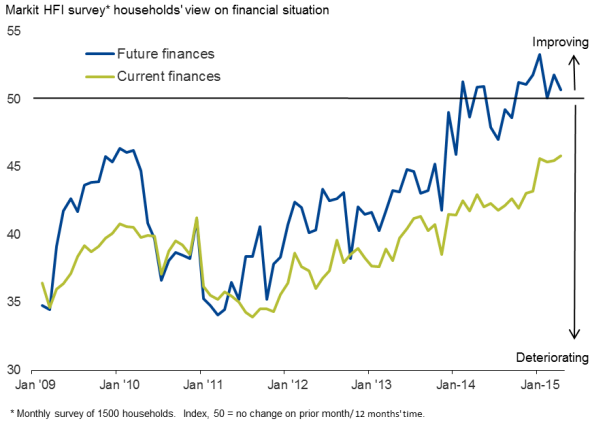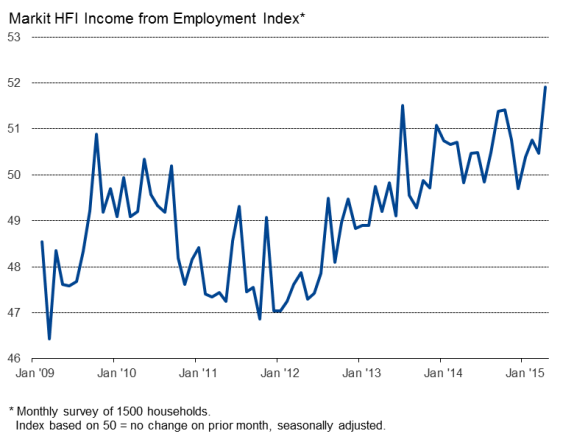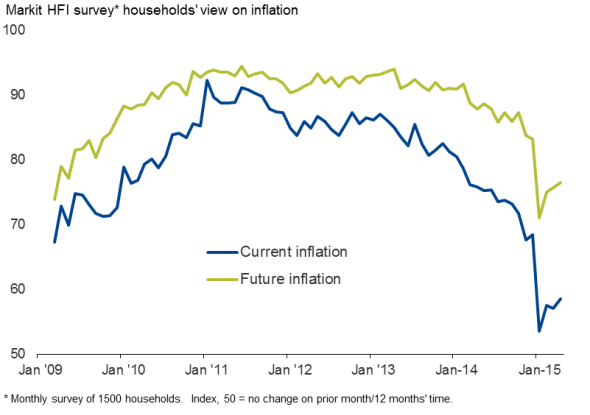Customer Logins
Obtain the data you need to make the most informed decisions by accessing our extensive portfolio of information, analytics, and expertise. Sign in to the product or service center of your choice.
Customer Logins
ECONOMICS COMMENTARY
Apr 22, 2015
Household financial woes ease to post-crisis low
UK households are seeing the largest increase in incomes since the recession struck, according to survey data, helping to push down both existing debt levels and the need for new credit.
Household sentiment, current and future finances

Markit's household survey data, which provides the first available indication of financial well-being each month, show income from employment rising at a rate not seen since data were first collected in February 2009.
Changes in household income

Despite the rise in incomes, overall spending levels were largely unchanged, with the survey indicating that households were focusing on paying down debt rather than spending more. The April survey saw one of the largest monthly falls in household debt yet recorded.
Recent months have also seen the smallest increase in demand for unsecured credit (such as credit card lending and non-mortgage loans) since the recession.
With extra incomes being used to pay down existing debt hangovers, the amount of cash that households have available to spend meanwhile continued to fall, as it has done continually since the survey began, but the decline in April was the smallest recorded to date.
The overall improvements in the survey measures were reflected in the headline Household Finance Index (HFI) reaching a record high, albeit still indicating that finances continue to deteriorate on a month-on-month basis.
Optimism for future finances wanes
However, the survey also indicates that households have become less optimistic about the outlook over the coming year. The forward-looking HFI measure signalled for a seventh straight month that finances are likely to be better than now in a year's time, but the improvement was down on the March reading to fall further below the survey high seen at the start of the year.
The lower degree of optimism is likely to be linked to at least three factors.
First, employees' workplace activity grew at the slowest rate for nearly one-and-a-half years, which is also likely to have been a factor leading to the greatest degree of job insecurity for five months.
Second, the recent improvement in finances has been linked to a sharp drop in both current and future perceptions of inflation, which has boosted real spending power. However, future inflation expectations picked up for a third month running in April.
Household inflation expectations

Third, although income from employment is rising, the rate of increase remains only modest, and households are only expecting weak wage growth in 2015. The survey data pointed to an average anticipated pay increase of just 1.0% this year (see separate note).
Risk to the outlook
With inflation set to start rising again later this year, there is clearly a risk that economic growth could slow unless incomes start to rise to offset price rises. The survey suggests that this process of rising incomes is underway, but progress is slow. Pay growth in 2015 will need to pick up much faster than households are expecting to provide a meaningful boost to the economy if inflation revives.
Chris Williamson | Chief Business Economist, IHS Markit
Tel: +44 20 7260 2329
chris.williamson@ihsmarkit.com
{"items" : [
{"name":"share","enabled":true,"desc":"<strong>Share</strong>","mobdesc":"Share","options":[ {"name":"facebook","url":"https://www.facebook.com/sharer.php?u=http%3a%2f%2fwww.spglobal.com%2fmarketintelligence%2fen%2fmi%2fresearch-analysis%2f22042015-economics-household-financial-woes-ease-to-post-crisis-low.html","enabled":true},{"name":"twitter","url":"https://twitter.com/intent/tweet?url=http%3a%2f%2fwww.spglobal.com%2fmarketintelligence%2fen%2fmi%2fresearch-analysis%2f22042015-economics-household-financial-woes-ease-to-post-crisis-low.html&text=Household+financial+woes+ease+to+post-crisis+low","enabled":true},{"name":"linkedin","url":"https://www.linkedin.com/sharing/share-offsite/?url=http%3a%2f%2fwww.spglobal.com%2fmarketintelligence%2fen%2fmi%2fresearch-analysis%2f22042015-economics-household-financial-woes-ease-to-post-crisis-low.html","enabled":true},{"name":"email","url":"?subject=Household financial woes ease to post-crisis low&body=http%3a%2f%2fwww.spglobal.com%2fmarketintelligence%2fen%2fmi%2fresearch-analysis%2f22042015-economics-household-financial-woes-ease-to-post-crisis-low.html","enabled":true},{"name":"whatsapp","url":"https://api.whatsapp.com/send?text=Household+financial+woes+ease+to+post-crisis+low http%3a%2f%2fwww.spglobal.com%2fmarketintelligence%2fen%2fmi%2fresearch-analysis%2f22042015-economics-household-financial-woes-ease-to-post-crisis-low.html","enabled":true}]}, {"name":"rtt","enabled":true,"mobdesc":"Top"}
]}



